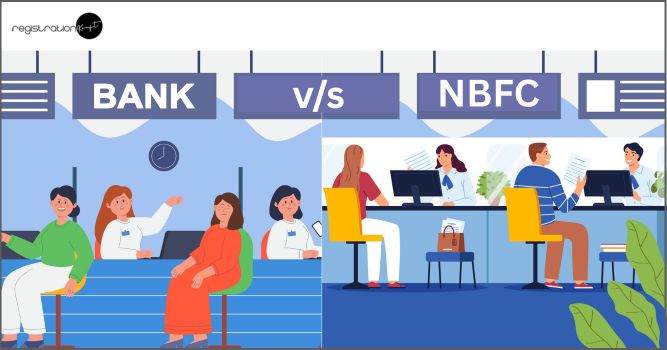Difference Between NBFC and Bank

When we think about money-related institutions, two common names pop into our heads – Banks and NBFCs (Non-Banking Financial Companies). At first glance, they might look the same because both deal with loans, deposits, and other financial services.
But in reality, Banks and NBFCs are like two different roads leading to the same city – they both aim to serve customers’ financial needs, but the rules, services, and structures are different.
What is a Bank?
A Bank is a government-approved financial institution that can accept deposits from the public and lend money. It operates under the Banking Regulation Act, 1949 and is regulated by the Reserve Bank of India (RBI).
- Example: State Bank of India (SBI), HDFC Bank, ICICI Bank.
- Banks offer savings accounts, current accounts, fixed deposits, loans, credit cards, and more.
What is an NBFC?
A Non-Banking Financial Company (NBFC) is a company that provides financial services without holding a banking license. It cannot offer all the services a bank can, but it plays a huge role in providing credit, especially in areas where banks may not reach.
- NBFCs are regulated by the RBI under the RBI Act, 1934, but their scope is different.
- Example: Bajaj Finance, Muthoot Finance, Shriram Transport Finance.
- NBFCs mostly deal in loans, hire purchase, leasing, investment, and insurance services.
Key Differences Between NBFC and Bank
| Basis | Bank | NBFC |
| Regulation | Banking Regulation Act, 1949; regulated by RBI | RBI Act, 1934; regulated by RBI |
| Deposits | Can accept demand deposits (savings & current accounts) | Cannot accept demand deposits |
| Payment Systems | Can issue debit cards, credit cards, and offer payment services | Cannot issue debit cards; can issue credit cards only with RBI approval |
| CRR & SLR | Must maintain CRR (Cash Reserve Ratio) & SLR (Statutory Liquidity Ratio) | Not required to maintain CRR; may have some SLR requirements depending on type |
| Foreign Exchange | Can deal in foreign exchange (with permission) | Cannot directly deal in foreign exchange |
| Cheque Facility | Can issue cheques via savings/current accounts | Cannot issue cheque facility |
| Credit Creation | Banks create credit through deposits and lending | NBFCs cannot create credit in the same way as banks |
Why Both Are Important
- Banks are the backbone of the economy, ensuring safe deposits and wide access to money.
- NBFCs fill the gap where banks may not operate actively – like small towns, niche markets, or quick personal loans.
Together, they make financial services more accessible for everyone.
Frequently Asked Questions (FAQs)
Q1: Can NBFC accept deposits?
Yes, but only certain NBFCs (called deposit-taking NBFCs) can accept term deposits, and they must follow RBI guidelines. They cannot accept savings or current account deposits.
Q2: Who regulates NBFC?
NBFCs are regulated by the Reserve Bank of India (RBI) under the RBI Act, 1934.
Q3: Can NBFC issue credit card?
Yes, but only with prior approval from the RBI. Not all NBFCs issue credit cards.
Q4: Can NBFC issue debit card?
No, NBFCs cannot issue debit cards because they cannot maintain savings or current accounts.
Q5: Can NBFC borrow from RBI?
Generally, NBFCs cannot directly borrow from RBI like banks do, but they may receive funds through special RBI schemes or refinancing agencies.
Q6: Is NBFC a financial institution?
Yes, NBFCs are financial institutions that provide financial services without having a full banking license.
Final Word
If banks are the “highways” of our financial system, NBFCs are the “side roads” that reach every corner. Both have unique roles, and knowing the difference helps you choose the right option for your financial needs.
Categories: Banking
Tags:





